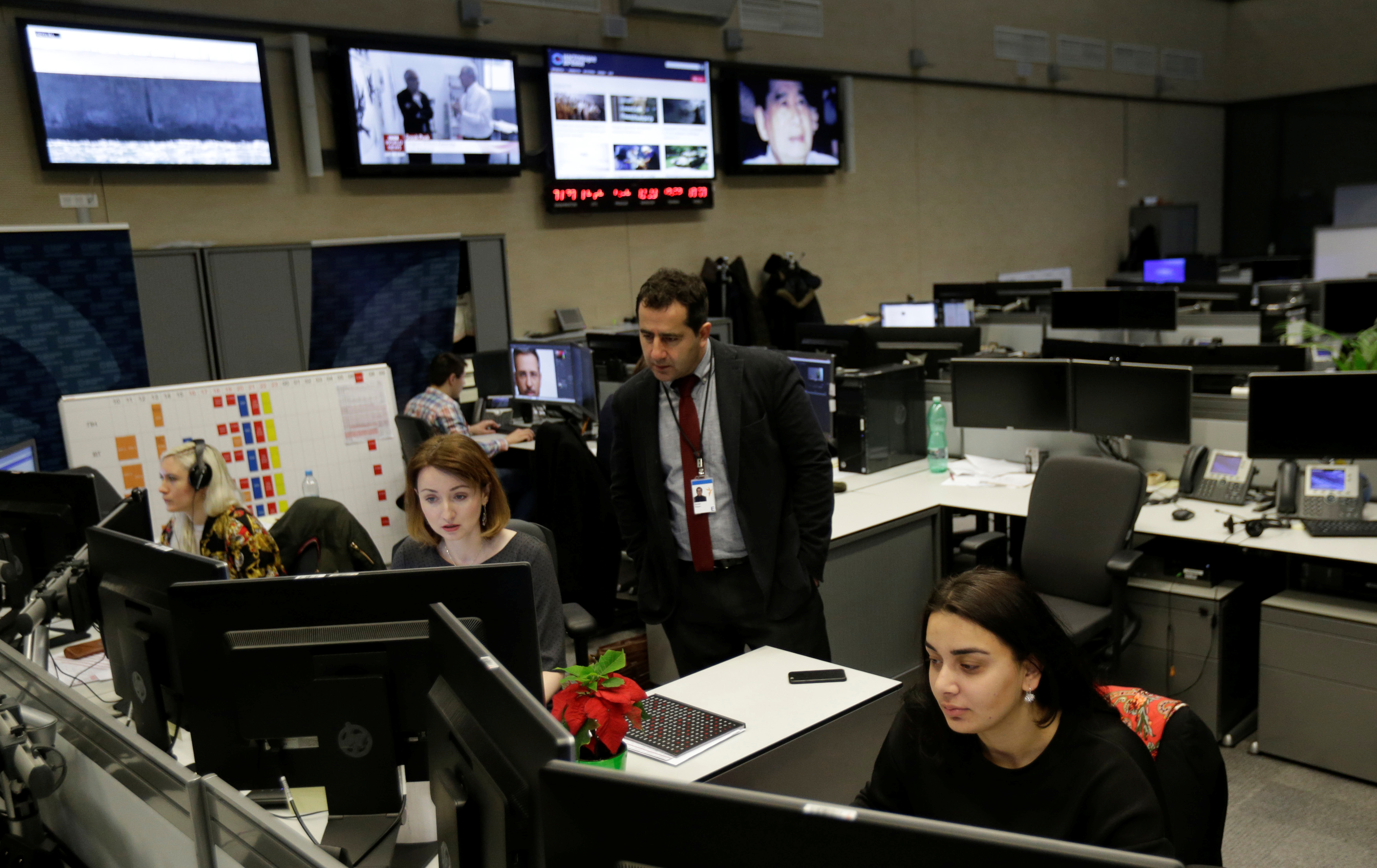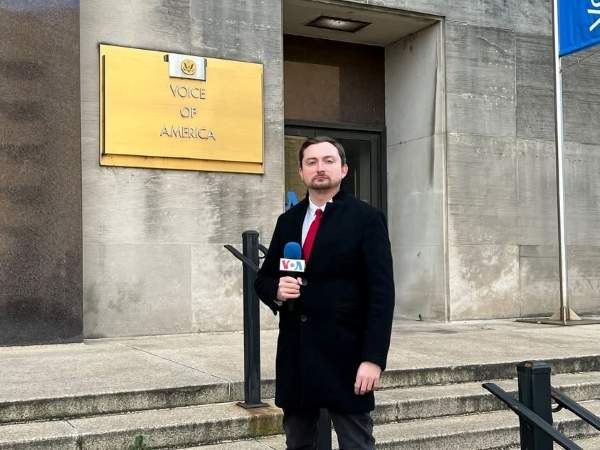As Trump guts US global media agency, thousands of journalists are left in limbo

Workers of Current Time, a Russian-language media platform, sit in a newsroom at Radio Free Europe headquarters in Prague, Czech Republic, February 7, 2017. REUTERS/David W Cerny
Since 1942, millions of people living under dictatorships have turned to Voice of America to hear what their governments wouldn’t tell them. On 15 March, the broadcaster’s channels began to fall silent. Some radio stations played music, TV channels looped the text of a mission statement overimposed on stylised waving American flags. At the time of this writing, the home page for its English-language website still sported that day’s headlines.
One day earlier, Donald Trump signed a directive instructing the US Agency for Global Media (USAGM) to reduce its operations to the legal minimum. This effectively gutted the agency, which oversees Voice of America (VOA) and funds regional broadcasters Radio Free Europe / Radio Liberty (RFE/RL), Radio Free Asia (RFA) and Middle East Broadcasting Networks (MBN).
The decision followed comments by Donald Trump, Elon Musk and other allies accusing USAGM outlets of being biased and wasteful. Almost all of the VOA staff were placed on administrative leave. RFE/RL and RFA, which were set up to serve Eastern European and Asian audiences respectively, had their funding grants terminated, leading to more furloughs and precarity.
The outlets filed lawsuits against the administration and enjoyed a reprieve after court orders barred USAGM from further action to fire or furlough VOA staff and requested RFE/RL’s funding be reinstated. Radio Free Asia has also filed a separate complaint.
Despite a letter from top Trump advisor Kari Lake rescinding USAGM’s previous grant termination to RFE/RL, the broadcaster has not yet received funds and has begun to furlough staff.
On 4 April, USAGM terminated contracts with two satellite systems used to broadcast RFE/RL’s Current Time Russian-language services. The Current Time network, which is labelled an ‘undesirable organisation’ by the Russian government, continues to produce programming accessible online.
For now, over 2,000 people employed by VOA, 1,700 by RFE/RL, 615 by Middle East Broadcasting Networks, and 380 by RFA find themselves in limbo as the future of their organisations hangs in the balance.
Some of these journalists are facing persecution in their home countries as a consequence of their work. RFE/RL reporter Andrey Kuznechyk was detained by Belarus for over three years, his colleague Alsu Kurmasheva by Russia for nine months. There are 10 journalists working for USAGM networks currently jailed or imprisoned, according to the agency's website. 20 are listed as having been killed, the first in 1954, the most recent in 2022.
We spoke to five of these journalists about how they’re experiencing this tumultuous time. They expressed shock at how quickly and aggressively the administration moved to gut their organisations, discussed their concerns for their colleagues whose visas depend on their employment, and in some cases held onto hope. Here’s their account of this challenging time in their own words.

Maryana Drach
RFE/RL Ukrainian Service director
We learned about the executive order on the website of the White House.
There is a sense of shock, but also a strong sense of pride in the work we do. The Ukrainian service has existed since 1954, and RFE/RL in Ukraine is one of the most trusted outlets in the country.
We have earned a reputation for holding Ukrainian government leaders accountable. Recent investigations led to the resignation of senior officials in the Zelensky government, including a Supreme Court justice who lied about Russian citizenship and the Deputy Prosecutor General who got a sweetheart real estate deal.
The Ukrainian service is primarily a digital media outlet, with a weekly reach of 25% in the country, according to Gallup. Our correspondents risk their lives on the frontlines, and we address the most pressing issues in Ukraine.
Today our thoughts are with Vladyslav Yesypenko, our colleague who is behind bars in Russian-occupied Crimea. He was thrown into prison because Russia wanted to silence us. And who is celebrating the most the defunding of RFE/RL? Hosts at Russian state TV are not hiding their joy.
Our audience is concerned about our future. One of the messages we received from Crimea reads: “Strength to you – to survive these days. Please pass on words of support to the entire team.”
Former political prisoner Stanislav Aseyev shared on X: “Once, during torture, I was shocked just for writing for RFE/RL: I was told it was 'a CIA structure and an enemy of Russia,' and because of that, I was already guilty. Now, the 'enemy of Russia' is being destroyed by America itself, and my torture seems doubly pointless.”
Stanislav Fedorchuk, a political scientist from Donetsk, said: “For me personally, the closure of Donbas Realities (one of RFE/RL's projects) symbolises the legalisation of the occupation. One of the most effective communication channels within the occupied territories has now been destroyed.”
Ukrainian Nobel Peace Prize winner Oleksandra Matviychuk also voiced her support on LinkedIn, saying: “It is difficult to imagine journalism as such without you. You adhered to journalistic standards. Even in the post-truth world, you sought to give people a real picture without distortions and manipulations. You were a voice from the territories occupied by Russia. You spoke for people in those countries where freedom of speech is being killed and persecuted.”
RFE/RL's Ukrainian service has made some difficult decisions to freeze cooperation with many freelancers, and this has affected our coverage. But we keep reporting and covering the war. For instance, we just released an investigation that sheds new light on the mass executions of civilians in Bucha during Russia's occupation in March 2022. Our correspondents covered the Russian missile strike on the Kyiv industrial district last weekend and the horrendous Russian attack on Kryvyi Rih, where children were hit. But the situation remains critical.

Alexey Gorbachev
Journalist with VOA's Russian service
When I first started working at VOA six years ago, I felt very excited to tell the world what is happening in Russia without censorship: press freedom issues, the opposition movement, oppressed dissidents, political persecution, and election fraud. We are banned in Russia, but people use VPNs to access us. And even though VOA is not the biggest outlet for Russian audiences, some of our YouTube videos gather millions of views because we cover topics that are silenced.
While on vacation in Arizona, I saw an article in The New York Times about Trump shutting down USAGM. I couldn’t believe it.
Over the weekend, they laid off 550 journalists out of 1,300, and the rest were placed on administrative leave. We received termination notices, saying that our service was no longer needed, and that our last paycheck would be on 31 March. We were cut off from all systems. We weren't even able to tell our audience what happened to us.
Some people were working on J-1 visas. With the termination of their contracts, these visas are also terminated. So my colleagues with this type of visa were instructed that they had to depart from America within 30 days, and they were even offered tickets to Russia.
With Trump’s second term, my colleagues and I could expect certain changes, such as a reduction in our staff, but we did not expect that they would try to shut down VOA completely. The Voice of America is not funded by Trump or Biden. It's funded by American taxpayers and it has always been a bipartisan outlet. We did not expect such a decision. We had funds and an approved budget. We could have continued working at least for some time.
I am planning to stay in the US. I've been living and studying here, I have loans and a lease to pay. America is my second home, but now I feel as if I am in my first home. In Russia, as a journalist, I faced restrictions and couldn’t work independently without government interference. Unfortunately, here I also lost my job because of government actions and administrative decisions.
And yet the situation is different because the president’s power is limited in the US, and we still have courts and Congress, which includes both Republicans and Democrats. The American people can also speak up. I believe that there is a light at the end of the tunnel because many people, both Republicans and Democrats, disagree with what’s happening, so I still have hope.

Alexis Strope
Co-host on VOA’s 'International Edition'
I started with Voice of America in August 2023, first as a multimedia journalist and then as co-host of International Edition, one of VOA's global news podcasts. I felt proud to be a part of this newsroom because of its mission of countering propaganda in so many countries and giving unbiased stories to millions of people. Another point of pride for me was to be on the air at Voice of America as a transgender person.
I considered VOA one of the safer agencies to work for – that proved not to be true. When this decision came down, I felt devastated. I was getting ready to do my first newscast for the afternoon when the message came to stop all work. I was put on administrative leave.
There is a lot of anxiety among the staff, myself included. We’re all nervous for our colleagues who may have to go back to their home countries and face these regimes head-on. What is happening with VOA now not only puts our jobs at risk. It’s a challenge for free speech.
I came to Voice of America under the Biden administration, when transgender people were seen just like everyone else. Part of my fear now is that, even with the potential of VOA being reestablished, depending on what the courts say, the institution could have to start over from the beginning. I don’t know how I’m going to be viewed in that process, given this administration’s views on transgender people.
I hope that I get to continue at Voice of America in some fashion. If not, I hope I get to continue somewhere else. It is not a good time for transgender people in the US right now. Thankfully, there are still plenty of states that stand by our rights.
It’s a weird position to be in. On the one hand, to be vilified as a transgender person, and on the other, to be vilified as a journalist. It’s like I'm being hit from two different directions. But nothing is going to stop me in my journey in life. I want to get back to work. I have not given up on the idea of Voice of America. I am hoping.

Fatima Tlis,
Supervisory editor of VOA’s fact-checking team Polygraph.info
I have known Voice of America since my childhood. I grew up in the USSR, and I remember how KGB officers would come to schools to share so-called Politinformatsia [Political Information]. They told us about America, “the greatest evil on Earth,” explaining why we should hate the US and should not listen to VOA. Of course, that sparked even more interest in VOA, and I listened to it with my grandfather and my mom. It was a generational thing.
I was always amazed by the way Voice of America bridged this information wall and delivered the news that we otherwise would never have known, living in the Caucasus in a small town in the mountains. We learnt about the Chernobyl nuclear disaster from Voice of America at a time when our government and our media said nothing about it for weeks.
I have been working for VOA since 2010. Joining it was a deliberate choice. I came to the United States after requesting political asylum as a Circassian journalist who covered the North Caucasus and was targeted with persecution.
I was editor-in-chief of the Caucasus desk for the Regnum News Agency, worked with the Associated Press, and reported for Radio Free Europe. My reporting wasn’t something the Russian government wanted to get out, especially to foreign audiences. I endured arrests, kidnappings, torture and even poison. By granting me asylum, the American government and American people saved my life. So I thought that by joining Voice of America, I would repay my debt to these people who were so good to me.
What is going on with VOA right now is very tough. It’s sad to hear descriptions of the Voice of America as the “Department of Propaganda” or “rotten fish” or claims that the agency has lost its sense of mission from high officials and people with immeasurable wealth. None of that is true. We deserve to be treated with dignity. There are a lot of well-established journalists working in our team, some of whom have suffered immensely under the regimes they came from. People in their countries trust them.
We also have a shared sense of mission: serving the people, not just in the United States, but also in countries with no access to free information. Whatever we produced in English, we translated into more than 40 languages, allowing people to read and see the truth. Now it’s just frustrating to see that it all goes unchallenged.
I would love to keep working as a journalist. I have enormous knowledge and expertise in my field. But with thousands of people laid off, I’m not sure I will be able to. If I get fired, I’m going to survive because I’m a survivor. But it’s unimaginable that Voice of America could be silent forever.
An RFA journalist
This journalist asked to remain anonymous
Originally, I felt a bit optimistic. I used to think these cuts wouldn't affect RFA because Elon Musk only mentioned RFE and VOA. My friends at VOA already assumed the worst, so they were prepared. I wasn’t. It was quite surprising for me.
For now, because RFA is looking to take legal action against the executive order, I am still a bit optimistic because there are a lot of cases of Trump's executive orders being overturned, and VOA and RFE's funding has been reinstated. We are still waiting for the first hearing in the District of Columbia.
I think the court will make the right decision, but I’m not sure what will happen six months from now, when they start discussing funding for the next fiscal year. That will be the most decisive moment for RFA.
I am doubtful of our future. Things will not be the same, even if we get our funding back. What’s going to happen next? Would we be rehired if the funding comes back? Or should we just look for another job right now?
I recently heard that international stringers and contractors’ contracts will not be terminated – and that's a positive thing. On the other hand, management had promised they would do everything to protect staff who are on work-based visas, but I’ve heard of people being laid off, and some of our colleagues are understandably furious about this. That’s the most worrying part for all of us.
The staff working for the language services (Korean, Lao, Cantonese, not to mention Tibetan) are all at risk if they have to return to their home countries like China or Myanmar. This interview is what I can do for them.
Other than that, we don’t make the decision. Not my service director, or even the CEO. It’s up to Trump and Elon Musk.
I’ve also heard that the HR department’s attitude is quite hostile, and it’s not answering any questions about its decisions, which is utterly frustrating because we are the victims who got dragged into this mess. We are just hard-working journalists who want to fulfill RFA's mission and continue to contribute to our home country from exile. We do not deserve to be treated like this.
I am still trying to have a sense of what to expect, whether RFA would continue in some form. I also don’t know whether I'll still be welcome at RFA after all this, whether they’ll have the budget for me or whether there will be some drastic change in the organisation.
For now, I have started to look for a full-time job, but not in the same industry. I treasure the opportunity at RFA so much because it’s allowed me to continue my profession in my mother language.
If there’s no chance to come back, maybe this would be goodbye to my career because I’m still young. I think I can still find another career. But if you ask me, I don’t want to. If Radio Free Asia officially becomes history after 30 September, I plan to become an Uber driver.
In every email we send you'll find original reporting, evidence-based insights, online seminars and readings curated from 100s of sources - all in 5 minutes.
- Twice a week
- More than 20,000 people receive it
- Unsubscribe any time
signup block
In every email we send you'll find original reporting, evidence-based insights, online seminars and readings curated from 100s of sources - all in 5 minutes.
- Twice a week
- More than 20,000 people receive it
- Unsubscribe any time





